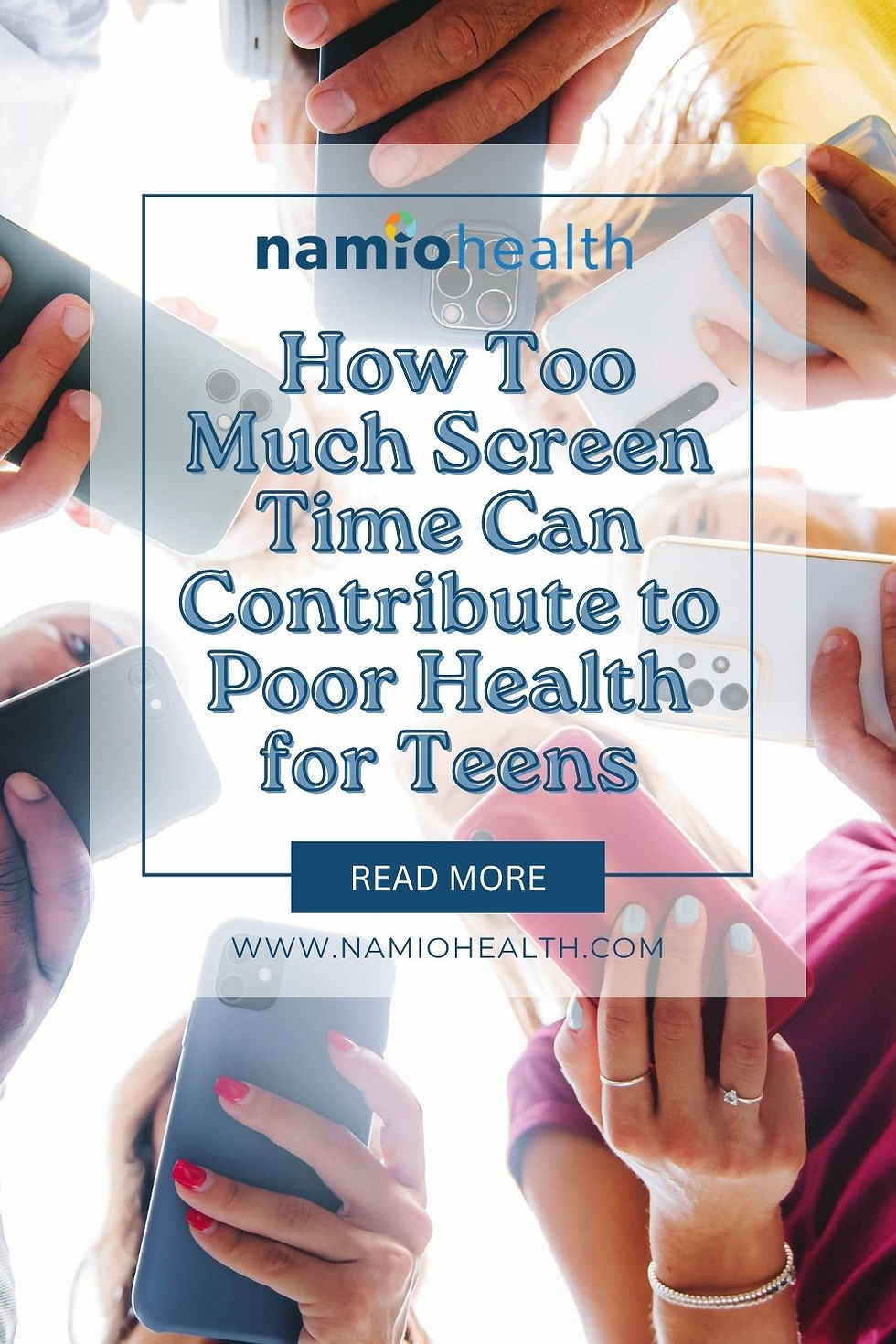How Too Much Screen Time Can Contribute to Poor Health for Teens
- Cassandra Padgett

- Sep 8, 2025
- 3 min read
While technology has its benefits, too much screen time can have a serious impact on teens’ health and development. As parents, it’s important to understand how excess screen use can affect our kids—and what we can do to help them find balance.

What Counts as Screen Time?
Screen time refers to any time spent using devices with screens—whether it’s for school, gaming, social media, streaming videos, or texting friends.
The American Academy of Pediatrics (AAP) recommends that teens prioritize healthy media habits and avoid excessive recreational screen use, particularly when it interferes with sleep, physical activity, or in-person relationships.
The Centers for Disease Control and Prevention (CDC) echoes this by encouraging less than 2 hours per day of recreational screen time (outside of schoolwork) for children and teens.
How Screen Time Can Contribute to Poor Health for Teens
1. Poor Sleep Quality
Blue light emitted by screens can interfere with the body’s natural sleep-wake cycle. When teens scroll late into the night, it delays melatonin production, making it harder to fall asleep—and stay asleep. According to the AAP, inadequate sleep in teens is linked to poor academic performance, mood issues, and increased risk for obesity.
What parents can do: Set a “screens off” time 1 hour before bed and keep devices out of bedrooms overnight.
2. Lower Physical Activity Levels
Excess screen time often means more time sitting and less time moving. The CDC reports that teens need at least 60 minutes of physical activity per day—but many fall short due to sedentary screen habits.
What parents can do: Encourage outdoor play, organized sports, or family walks. Set screen time limits to make room for movement.
3. Increased Risk of Mental Health Issues
Heavy social media use, cyberbullying, and constant comparison can take a toll on teen mental health. Studies show a link between excessive screen time and increased symptoms of depression, anxiety, and loneliness.
What parents can do: Talk openly about online experiences. Help your teen curate their feed and take digital breaks.
4. Unhealthy Eating Habits
Teens often snack mindlessly in front of screens or are influenced by unhealthy food marketing. Screen time during meals is also associated with poorer diet quality and lower fruit and vegetable intake.
What parents can do: Make family meals a screen-free zone and model mindful eating habits.
5. Impaired Social Skills and Relationships
When screens replace face-to-face interaction, teens may miss opportunities to build emotional intelligence, communication skills, and meaningful relationships.
What parents can do: Prioritize in-person time with friends and family. Encourage phone-free moments like during car rides or meals.
Find a Healthy Balance
The AAP recommends using a Family Media Plan to set age-appropriate limits, define screen-free zones, and create healthy routines. It’s not about cutting screens entirely—it’s about making intentional, balanced choices.
Tips to try:
Use the AAP Family Media Plan tool to set goals and create age-appropriate screen time boundaries for your family.
Designate “tech-free” times (like before bed, during mealtime, or while doing homework).
Encourage screen use for creativity and connection, not just passive scrolling.
Model healthy digital habits yourself—your teen is watching!
Final Thoughts
Technology is part of our world, and screens aren’t going away. But too much screen time can get in the way of the things that matter most for your teen’s health—sleep, movement, mental wellness, and meaningful connection.
With a little planning, your family can build healthier digital habits that support your teen’s growth and well-being.
Need help improving your family’s health and wellbeing? Follow @namiohealth on social media or check out www.namiohealth.com/parents
References:
American Academy of Pediatrics: Media and Children Communication Toolkit
AAP Family Media Plan Tool: HealthyChildren.org/MediaUsePlan




Comments